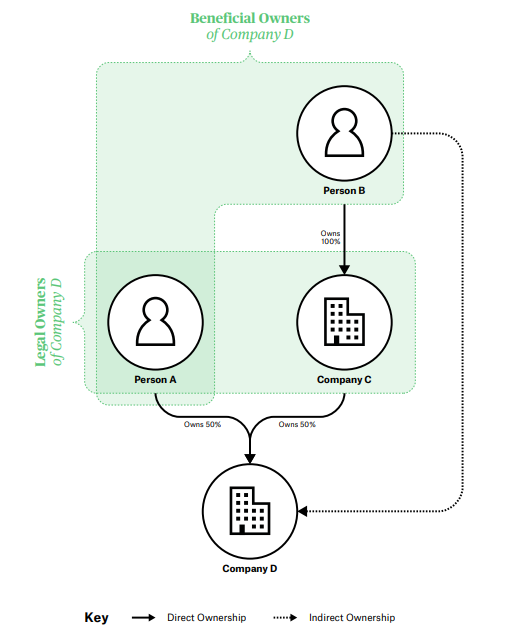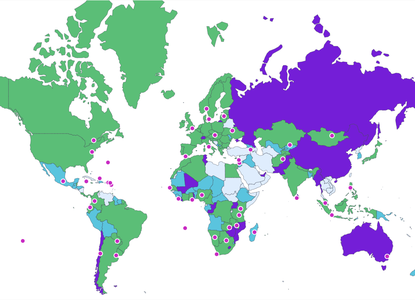What are beneficial owners?
A beneficial owner, sometimes called an ultimate beneficial owner, or UBO, is how we describe the real, human owners of corporate vehicles (such as companies). They are the people who can benefit from its operations and profits, or control its activities: the people at the top of the ownership chain.
A beneficial owner is a person who ultimately has the right to some share of a corporate entity’s income or assets, or the ability to control its activities. Often, the ownership structure of companies and other corporate vehicles, like trusts, can be complex and opaque. This means that the individuals who own, control, or benefit from corporate vehicles can remain hidden.
If the beneficial owners are hidden, then governments don’t know who is bidding for a contract, companies don’t know who they are doing business with, society doesn’t know who is financing a new political party, and law enforcement can’t fight money laundering and other cross-border financial crimes.

What is beneficial ownership transparency?
Beneficial ownership transparency, or BOT, is an area of policy reform. It refers to governments putting in place requirements for corporate vehicles to collect and disclose information about their beneficial owners in a register. Governments collate this information in central registers, and make it available to a range of actors, including law enforcement, tax authorities, the private sector as well as civil society.
These actors use the information for many different purposes. These include improving public procurement and taxation, improving the ease of doing business, and preventing corruption.
This booklet provides an introduction to beneficial ownership transparency (BOT). It also includes an overview of the ways in which Open Ownership is driving the global shift towards transparency and accountability in corporate ownership and control.
Corporate ownership: Rights and responsibilities
Owning or controlling a corporate entity comes with rights, such as limiting liability, as well as responsibilities to customers, shareholders, governments, regulators, and other businesses. Knowing the beneficial owner of a company helps identify where decisions are made and who should be held accountable.
Beneficial ownership differs from legal ownership. Companies can own or control other companies, and in this case they are known as legal persons.
Shell companies
Companies that only exist on paper, and that do not have any real operations or employees, are sometimes referred to as shell companies. Creating a shell company in a jurisdiction without company ownership disclosure requirements and transferring stolen assets to this company makes it difficult to follow the money between the stolen assets and their anonymous owners.
Shell companies in these jurisdictions facilitate organised crime, corruption, and tax evasion by making their owners anonymous. Setting up shell companies in multiple jurisdictions can make investigations even more complicated and challenging, as it allows people to pick and choose laws from different countries to suit their purposes. A study by the World Bank found that 70% of grand corruption cases studied involved the use of anonymously owned companies.
Shell companies in these jurisdictions facilitate organised crime, corruption, and tax evasion by making their owners anonymous.
Global momentum on beneficial ownership transparency
Making more of this information available to those who can use it effectively helps solve issues around corporate accountability and illicit financial flows. BOT is gaining momentum globally, with over 130 countries committed to implement reforms. The Financial Action Task Force (FATF), the G7, the G20, the International Monetary Fund (IMF), the UN, and the World Bank also support BOT. As do varied actors that both disclose and use beneficial ownership information.
In practice, this means more jurisdictions are requiring corporate vehicles to disclose information on their beneficial owners in order to make this information available to law enforcement or the general public. However, in some countries, accessing information on real owners can still be challenging. This can be because they have not yet implemented reforms, or because they have implemented them poorly.
Beneficial ownership transparency is gaining momentum globally, with over 130 countries committed to implement reforms.

